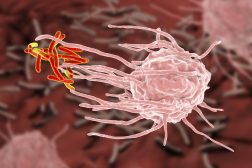Definition
noun, plural: exudate cells
Any of the cells participating in the forming of exudate during inflammation or a lesion
Supplement
Exudate is produced during inflammation or when there is a tissue injury. The cellular composition of an exudate may vary depending on the extent of tissue damage or injury. For instance, a purulent exudate has a large composition of white blood cells. In the beginning of inflammation, several neutrophils arrive and prevail at the site of injury. But when inflammation becomes chronic, mononuclear cells such as macrophages and lymphocytes predominate. Neutrophils are the first line of immune defense of the body. They actively migrate to the site of inflammation through the blood vessels and then through the interstitial tissues in response to chemotaxis. They destroy microorganisms that enter a disrupted skin barrier through phagocytosis. Their prevalence at the site of injury is an indication of an acute inflammation and the occurrence of a pyogenic bacterial infection.
Mononuclear phagocytes such as macrophages and lymphocytes arrive at the site during a chronic inflammation and microorganisms invading cells.
Other white blood cells such as eosinophils and basophils predominate as well when inflammation is caused by allergic reactions or as a response to parasitism.
Mast cells are also found as the cells releasing chemicals (e.g. histamine) that cause swelling of injured tissues.
Word origin: exudate, from Latin exsūdāre ex- (out) + sūdāre (to sweat) + cell
Synonym(s):
- exudation cell
- exudation corpuscle
- inflammatory corpuscle
- plastic corpuscle
See also:







